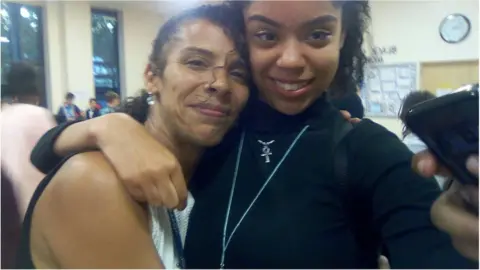Windrush scandal: 'No cap' on compensation claims
There is "no limit" to the amount of money that could be paid out to victims of the Windrush scandal, the home secretary has said.
Sajid Javid said he hoped the scheme would "right the wrongs" of a "mistake that should never have happened".
Thousands of people were wrongly targeted by the "hostile environment" strategy for illegal immigration.
Many of those affected were people from Caribbean countries who arrived in the UK between 1948 and 1971.
People from other Commonwealth and non-Commonwealth countries who arrived in the UK before 1988 were also affected and are eligible to apply for compensation, Mr Javid said in a Commons statement.
The estates of people who have died whilst waiting for their status would also be allowed to make a claim, he added.
Mr Javid said the "unacceptable treatment" experienced by some members of the Windrush generation, which came to public attention in late 2017, was of "profound regret".
The home secretary said he hoped the compensation scheme goes "some way" to delivering justice for those affected.
He added there was no cap for the amount of compensation that could be paid out per claim but the "baseline estimate" for total payouts was £200m.
A Home Office impact assessment estimates that the scheme will cost between £49m and £587m - taking compensation and operational costs into account.
The assessment says there's "significant uncertainty" about the costs because it was unclear how many people will apply.
Satbir Singh, chief executive of the Joint Council for the Welfare of Immigrants, said the announcement was "short on detail".
"While we welcome the creation of a compensation scheme, we know that money cannot buy back the years the victims have lost to destitution and anguish - nor can it compensate for the despair they felt at losing jobs, homes, health and a sense of identity and rightful pride in their contribution to the UK", he said.
'Validate the emotional distress'
One of those caught up in the scandal, Glenda Caesar, lost her job as a NHS administrator at a doctors surgery because she no longer had a British passport to prove her identity.
She told the BBC's Victoria Derbyshire programme she "couldn't work or receive benefits" and describes getting to a stage where "I just wanted to take some tablets and sleep".
Asked what she hopes to get from the Home Office scheme, she said: "Validate my loss of earnings, validate the emotional distress I've had to go through. I'm asking for not millions... but look at what I was earning, my pension - 10 years of my pension I lost as well - validate that."
 Willow Sims
Willow SimsWillow Sims, another person affected, says she is torn, as she "doesn't care about the money" and wants to "not feel like a criminal" so she can move on.
But she says she sees her children struggling, can't pay the rent, and is having to borrow money from friends and family.
"I need to at least recoup what I have lost", she says.


There's no cap on how much overall compensation someone can receive under the scheme but many categories have set payments.
For example, a person who was unlawfully deported will get £10,000; those detained for over 30 minutes are entitled to £500 per hour for the first three hours, followed by lower hourly rates if they're held for longer; and people wrongly made homeless can expect £250 per month, up to a maximum of £25,000.
With so many variables it's not surprising there's wide variation on how much the scheme will cost.
Officials in the Home Office say the final amount will range from £49m to £587m, depending on how many people apply; Sajid Javid says it's likely to be around £200m.
To give a sense of scale, that will be more than the £154m in compensation paid out to 40,000 victims of crime in England, Scotland and Wales last year under the Criminal Injuries Compensation Scheme.
More information on the scheme can be found here.

Another snub
Meanwhile, victims of the Windrush scandal claim they have been snubbed from an official reception to launch the compensation scheme.
Immigration lawyer Jacqueline McKenzie says she was asked to invite a handful of her clients to a "Windrush engagement" event, but only two of the six clients she represented were sent invitations.
She says it proves "nothing has been learned" by the Home Office and that "this group continues to be treated with contempt".
She said: "There will be drinks and canapes, and you know the black bourgeoisie, as I call them, the glitterati - they'll all be there."
But Ms McKenzie says the event should have been about "discussing this seriously with the people who work with Windrush [victims] and people who are affected by the scandal."
She also criticised the government for failures in setting up a hardship fund after the scandal came to light, saying "hardly anyone" been granted emergency support by the Home Office to date.
Sajid Javid told the House Of Commons that nine people have been awarded money from the hardship fund, which was set up last year to help victims in immediate need - whilst they waited for the launch of the compensation scheme.
